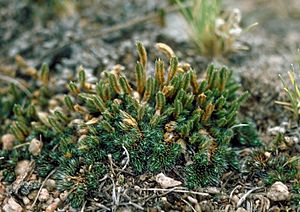Lesser spikemoss facts for kids
Quick facts for kids Lesser spikemoss |
|
|---|---|
 |
|
| Conservation status | |
| Scientific classification |
Selaginella densa, also known as lesser spikemoss or prairie spikemoss, is a small, mat-forming plant. It's a type of spikemoss, which are ancient plants related to ferns. You can find it growing across western North America, from Alaska all the way down to Texas. It also grows in places like Ontario and the Dakotas.
Contents
About Selaginella densa
This plant is a lycophyte, meaning it belongs to a very old group of plants. It forms flat mats or soft cushions on the ground. Its stems creep along and then branch upwards.
Where Selaginella densa Lives
Selaginella densa grows in many different places. You can find it in grasslands and even in the high, cold areas of mountains. It likes rocky and sandy ground.
- In prairies, especially shortgrass prairie on the Great Plains, it is a very common plant. It often grows right next to grasses.
- It also grows on windy, exposed rocks on mountain peaks. This includes ranges like the Cascade Range and the Front Range of the Rocky Mountains.
- This spikemoss is most common in dry, open areas. It can handle drying out quite easily.
What Selaginella densa Looks Like
The leaves of Selaginella densa are green and shaped like a line or a spear. They are about 5 millimeters long. The leaves lie flat against the stem. At the ends of the stems, there are cone-like structures called strobili. These can be up to 3 or 4 centimeters long.
Why Selaginella densa is Important
This compact plant covers the ground like a carpet. It helps protect the soil from being washed away by rain or wind. Because of this, it can be used in landscaping to prevent erosion.


